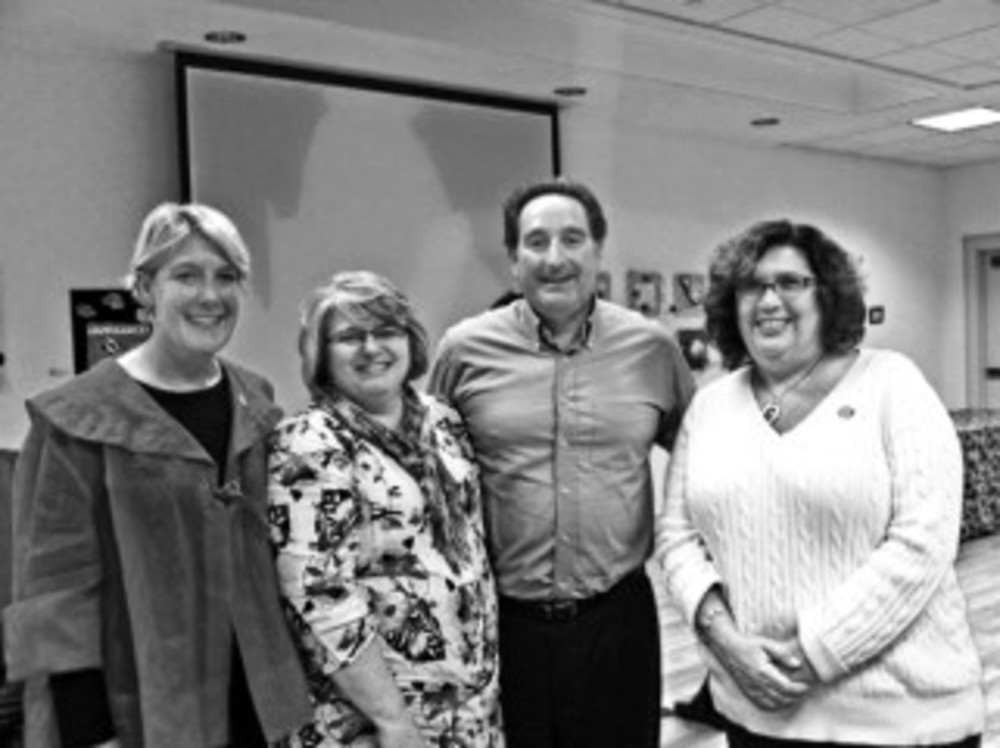Sharsheret, Hebrew for “chain,” visits Providence
Educates about family history and genetic testing
 PROVIDENCE – On Sunday, Oct. 6, about 68 women and 3 men, aged 28 - 88, gathered at Brown RISD Hillel to hear Sharsheret, a national not-for-profit organization supporting Jewish women and their families facing breast cancer, explain why Jewish families of all backgrounds need to be knowledgeable about the link between family history and cancer.
PROVIDENCE – On Sunday, Oct. 6, about 68 women and 3 men, aged 28 - 88, gathered at Brown RISD Hillel to hear Sharsheret, a national not-for-profit organization supporting Jewish women and their families facing breast cancer, explain why Jewish families of all backgrounds need to be knowledgeable about the link between family history and cancer.
Shera Dubitsky, Sharsheret’s clinical supervisor, explained that Sharsheret helps families from the screening process to see if a member is a BRCA gene carrier, to being diagnosed with advanced stage cancer. If you want to see what your family risk is, you can call a genetic counselor at Sharsheret. If you are not sure if you want genetic testing, a counselor can find you a peer supporter who also has to face these difficult decisions.
Not only did Shera explain all the services that are available to all women, confidentially and completely free of charge, from genetic counseling to peer support networks to family focus to providing resources and support for family and caregivers, but she also provided us with the startling statistics facing Jewish women. In the general population, 1 in 345 individuals carries the BRCA genetic mutation. For those of Ashkenazi Jewish descent, that number is 1 in 40. If you are a carrier, you have as high as an 80 percent lifetime risk of being diagnosed with breast cancer and as high as a 44 percent lifetime risk of ovarian cancer.
“Know your family history,” Dubitsky stressed. She educated us by explaining that most breast cancers are not hereditary. Not everybody should go for genetic testing. Go only if your family history warrants it. For this reason, Sharsheret encourages a conversation with a genetic counselor to see if you or your family members would benefit from genetic testing. What people do not always know is that this gene can be passed along from both the mother’s and father’s side of a family.
When asked if Sharsheret helps non-Jewish callers, Dubitsky replied, “Absolutely. We will help any woman. We are more knowledgeable, genetically, about Jewish women and we are here to help educate Jewish women, but we support all women and treat all women equally.”
Sharsheret was introduced to Rhode Island because of the passion of two people. In 2010, after Scott Libman’s mother died, he researched to see if there was a link between Jewish women and cancer and he came upon Sharsheret. He then became committed to introducing Sharsheret to the Jewish community of Rhode Island. After contacting Sharsheret and explaining that he was calling from Rhode Island, Dubitsky made the connection. “Rhode Island? My best friend lives in Rhode Island.”
Dubitsky called her best friend, Tina Odessa, and with Tina’s coordination, enthusiasm and persistence, Sharsheret, The Jewish Alliance, Jewish Family Services and Brown RISD Hillel came together to make this program happen. Tina formed a committee and put all of the pieces in place to make sure that a lasting relationship was formed.
Following the event, Dubitsky also met with Betsy Alper, Clinical Director of JFS, to discuss the possibility of forming focus groups to evaluate the needs in our community. Amanda Isenberg, committee member and President of JFS, said, “The BRCA gene is something that people are not talking about in the general public so I would have had no idea of the risk [level] that I am at, or that my friends are at without attending the program; and I think these types of programs save lives and, to me, that is invaluable.”
Techia Schochet thanked The Alliance, JFS and Brown for bringing Sharsheret to the state. “I found this inspiring, compelling and very practical to everyone in the room – survivors of cancer, people battling cancer and friends and family. People are much more aware of what’s out there and what is available to Jewish women if they find themselves in this situation.”
Shera closed by saying, “Sharsheret is thriving because this organization’s seeds were planted by a team of players, a community of women and men who use chesed, acts of kindness, as the yardstick by which to measure extraordinary contributions. Sharsheret is enabling you, me and thousands across the country to shape adversity into opportunity. Together we can make a difference.”
For more information on Sharsheret, contact sharsheret.org or call 866-474-2774.
Wendy Joering (wjoering@jewishallianceri.org), Community Concierge of the Jewish Alliance, can also be reached at 421-4111 ext. 169.







